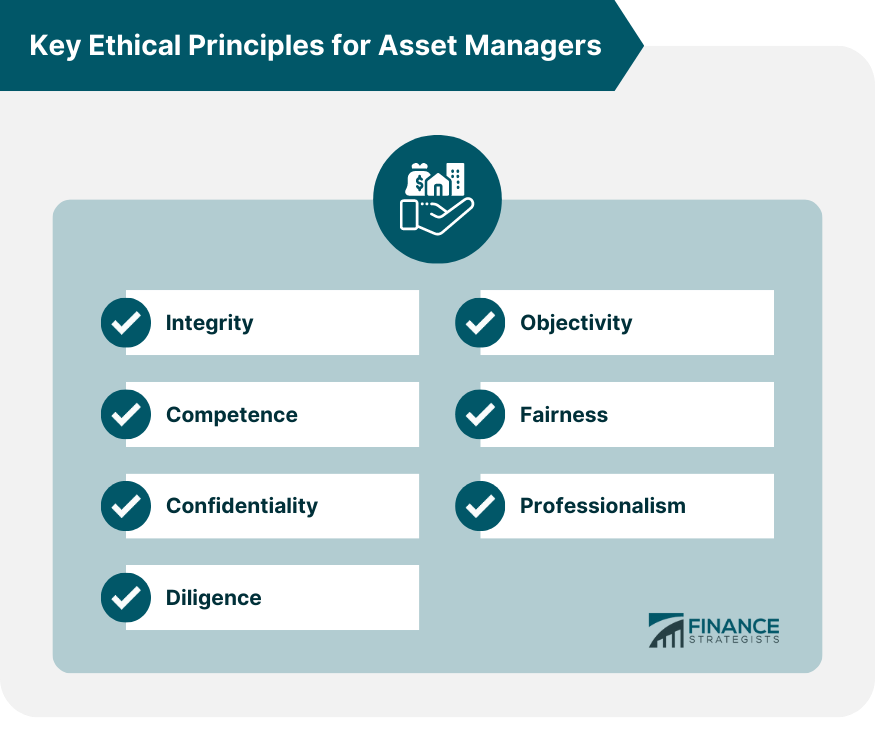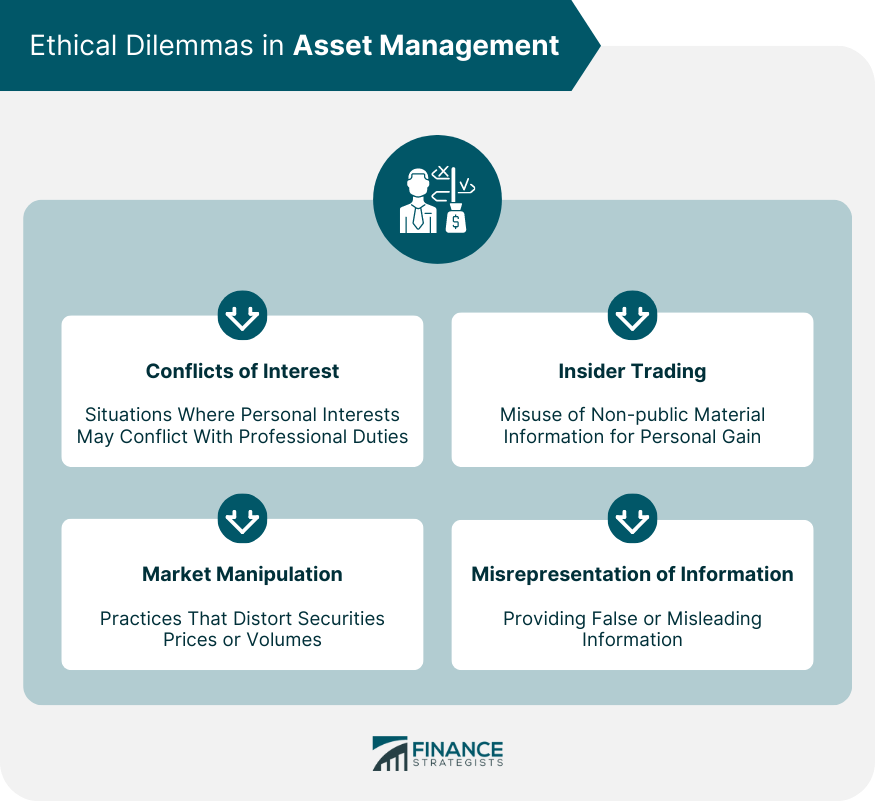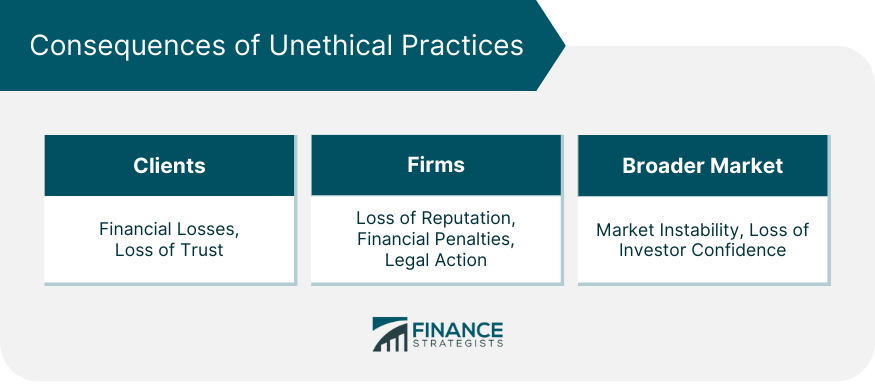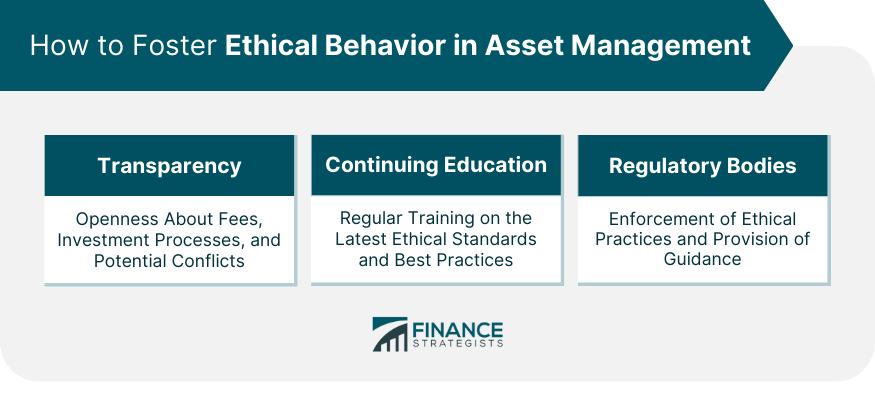Asset management is the systematic process of developing, operating, maintaining, upgrading, and disposing of assets cost-effectively, primarily in financial terms, often within the financial sector. Ethics in asset management is crucial to maintain trust and confidence among clients, stakeholders, and regulatory authorities. It ensures transparent and fair practices, mitigating the risk of fraud and conflicts of interest. Ethical behavior also promotes sustainable investment by considering environmental, social, and governance factors. Compliance with ethical standards helps in long-term wealth creation, fosters client loyalty, and safeguards the reputation of the institution. Violation of these principles can lead to legal repercussions and damage credibility. Thus, strong ethics form the backbone of asset management, crucial for financial stability, market integrity, and customer satisfaction. Integrity requires asset managers to uphold honesty and straightforwardness in all professional and business relationships. This means avoiding deceitful practices such as misrepresenting information or engaging in fraudulent activities. For instance, they must provide truthful reports about investment performance and prospects to their clients and stakeholders. Objectivity requires asset managers to make decisions based on factual and unbiased information, disregarding personal feelings or biases. This principle discourages the influence of personal relationships, conflicts of interest, or incentives that might compromise their professional judgment or independence. Competence mandates asset managers to attain and continuously improve their professional knowledge and skills to offer competent services. They must stay updated with the latest market trends, regulatory changes, and advancements in financial tools and technologies. Further, they must use their competence to make sound investment decisions in their clients' best interest. Fairness implies treating all clients equitably, without any discrimination or favoritism. Asset managers must provide all clients with equal access to opportunities and information, ensure transparent fee structures, and apply consistent investment policies across all clients. Confidentiality requires asset managers to protect client information diligently. They must not disclose any client-specific information without proper authorization or use the information for personal gain. This includes respecting privacy and using secure systems to protect data from breaches. Professionalism requires asset managers to act in a manner that upholds the reputation of the profession. This includes complying with both the letter and the spirit of laws and regulations, adhering to the standards and guidelines of professional bodies, and maintaining a respectful and courteous demeanor toward clients, colleagues, and other stakeholders. Diligence mandates asset managers to act with care, thoroughness, and timely responsiveness. They must undertake rigorous analysis before making investment decisions, regularly review portfolios, and promptly respond to client queries and concerns. Diligence also involves being proactive in identifying risks and ensuring suitable risk management practices. Conflicts of interest occur when an asset manager's personal interests clash with their professional duties, influencing decision-making. For example, if an asset manager has a personal stake in a particular company, they might be tempted to allocate more of their clients' funds to that company, regardless of whether it's in the client's best interests. This can compromise the fiduciary responsibility of the asset manager towards their clients. To manage such conflicts, disclosure to clients and abstaining from decision-making related to the conflicting interest can be effective. Insider trading is another major ethical issue. It involves trading based on non-public, material information about securities. For instance, an asset manager who has insider information about a company due to their professional contacts might use this information to buy or sell securities to benefit their portfolio. Such acts not only betray clients' trust but also violate laws, attracting severe penalties. Market manipulation refers to artificially inflating or deflating the price of a security or otherwise influencing the behavior of the market for personal gain. Practices like 'pump and dump,' 'churning,' or spreading false news to influence stock prices fall under this category. These tactics distort market mechanisms, disadvantage other investors, and reduce overall confidence in the market. Misrepresentation of information involves presenting inaccurate or misleading details about financial products or services. An asset manager might misrepresent the performance history, risks, or expected returns of an investment product to attract more clients or to retain existing ones. However, such practices can lead to loss of client trust, damage to reputation, and potential legal actions. When ethical norms are violated, clients bear the brunt of the impact. They could suffer financial losses due to mismanagement of funds or fraud, leading to loss of trust in the asset manager and the financial system at large. It can also result in clients withdrawing their assets, causing significant financial disruption for them. Unethical practices can have devastating effects on asset management firms. These include loss of reputation, reduced client base, financial penalties, and potential legal action. Moreover, these impacts are not just confined to the offending firm. A significant scandal can shake investor confidence in the broader financial market, leading to instability and volatility. Professional bodies play a pivotal role in upholding ethical standards in the finance industry, and they have established comprehensive codes of ethics to guide practitioners. For instance, the CFA Institute, a global association of investment professionals, has a detailed Code of Ethics that underscores several crucial areas: The CFA Institute's Code of Ethics highlights the duty of asset managers to act in the best interests of their clients. This involves exercising diligence and thoroughness in investment analysis, making suitable recommendations, and taking prompt action. Asset managers are also required to maintain confidentiality and act with integrity in their dealings with clients. Asset managers have a duty to their employers, which includes maintaining loyalty and acting in a professional and ethical manner. This implies avoiding conflicts of interest and not causing harm to their employers' reputation or business operations. The code also encourages asset managers to promote ethical behavior within their organizations. This section stresses the need for thorough, objective, and independent analysis to inform investment recommendations and actions. Asset managers must base their decisions on reliable data, utilize appropriate methodologies, and disclose any limitations or risks associated with their recommendations. The code demands the identification, management, and disclosure of conflicts of interest that could compromise the interests of clients or employers. Such conflicts could arise from personal relationships, outside business activities, or receipt of gifts or benefits. As members or candidates of the CFA Institute, individuals are expected to uphold the reputation of the profession and the CFA designation. This involves adhering to the Code of Ethics and Standards of Professional Conduct, cooperating with any CFA Institute investigations into misconduct, and not engaging in any conduct that could undermine public confidence in the profession. Transparency is one of the most crucial elements in fostering ethical behavior. This means being open about fees, investment processes, risks, and potential conflicts of interest. Transparency helps build trust, assures clients that their interests are being prioritized, and promotes accountability. Ongoing education and training programs can keep asset managers updated on the latest ethical standards, laws, and best practices. These can range from formal education programs to workshops, webinars, or even internal training programs at asset management firms. Regulatory bodies play a critical role in enforcing ethical practices. They establish rules and standards, monitor compliance, and impose penalties for violations. They also provide resources and guidance to help asset managers understand and meet their ethical obligations. The practice of ethics in asset management is a fundamental necessity with far-reaching implications for clients, firms, and the broader financial market. The adherence to ethical standards such as integrity, objectivity, competence, fairness, confidentiality, professionalism, and diligence sets the tone for building trust, ensuring transparency, promoting sustainability, and averting fraud. Asset managers must navigate potential ethical dilemmas such as conflicts of interest, insider trading, market manipulation, and misrepresentation of information with unwavering moral fortitude. The violation of these standards results in severe repercussions, affecting the financial stability and the overall integrity of the financial market. Professional bodies and regulatory authorities play an instrumental role in fostering ethical behavior through comprehensive codes of ethics, ongoing education, and stringent regulatory oversight. Undoubtedly, robust ethical conduct is the linchpin that binds the asset management industry together, paving the way for sustainable wealth creation and financial stability. Importance of Ethics in Asset Management
Key Ethical Principles for Asset Managers
Integrity
Objectivity
Competence
Fairness
Confidentiality
Professionalism
Diligence

Ethical Dilemmas in Asset Management
Conflicts of Interest
Insider Trading
Market Manipulation
Misrepresentation of Information

Consequences of Unethical Practices
Impact on Clients
Impact on Firms and the Financial Market

Professional Bodies and Their Codes of Ethics
Duties to Clients
Duties to Employers
Investment Analysis, Recommendations, and Actions
Conflicts of Interest
Responsibilities as a CFA Institute Member or CFA Candidate
How to Foster Ethical Behavior in Asset Management
Transparency
Continuing Education and Ethical Training
Regulatory Bodies

Bottom Line
Key Ethical Principles for Asset Managers FAQs
Ethics in asset management involves the moral principles that guide asset managers' actions and decisions. They promote trust, transparency, and fair dealings.
Common ethical dilemmas in asset management include conflicts of interest, insider trading, market manipulation, and misrepresentation of information.
Unethical practices can lead to a loss of client trust, financial penalties, and legal action, and can even impact the broader financial market's stability.
Key ethical principles for asset managers revolve around integrity, objectivity, competence, fairness, confidentiality, professionalism, and diligence.
Ethical behavior in asset management can be fostered through transparency, continuing education and ethical training, and the effective role of regulatory bodies.
True Tamplin is a published author, public speaker, CEO of UpDigital, and founder of Finance Strategists.
True is a Certified Educator in Personal Finance (CEPF®), author of The Handy Financial Ratios Guide, a member of the Society for Advancing Business Editing and Writing, contributes to his financial education site, Finance Strategists, and has spoken to various financial communities such as the CFA Institute, as well as university students like his Alma mater, Biola University, where he received a bachelor of science in business and data analytics.
To learn more about True, visit his personal website or view his author profiles on Amazon, Nasdaq and Forbes.















